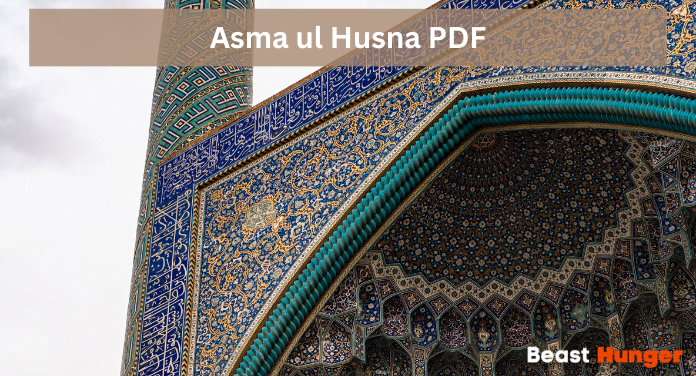The 99 Names of Allah, also known as the Asma ul Husna, are the names and attributes of God in Islam. Asma ul Husna means “the most beautiful names” in Arabic. We have brought for you asmaul husna pdf for the devotees of Allah. Al-Asma-Ul-Husna Urdu Learning and memorizing the 99 names of Allah is regarded with great reward, as these names help us understand God’s qualities and build a personal connection with Him.
Introduction to Asmaul Husna pdf
Asma ul Husna has its origins in a famous hadith (saying of Prophet Muhammad PBUH), which states:
“Allah has ninety-nine names, i.e. one-hundred minus one, and whoever knows them will go to Paradise”.
This hadith emphasizes the importance of learning the names of Allah. Memorizing them leads to Paradise, while calling upon Allah using these names can help supplications get answered.
There are multiple references to Allah’s names in the Holy Quran as well. For example:
“The most beautiful names belong to Allah: So call on Him by them” (Quran, 7:180)
Knowing Allah’s names enables establishing a personal and profound connection with him. That’s why Asma Ul Husna holds special status in Islamic spirituality.
99 Names of Allah List
Here is the complete list of the 99 names of Allah with English meanings[2]:
ٱلْرَّحْمَـانُ AR-RAHMAAN The Most or Entirely Merciful ٱلْرَّحِيْمُ AR-RAHEEM The Bestower of Mercy ٱلْمَلِكُ AL-MALIK The King and Owner of Dominion ٱلْقُدُّوسُ AL-QUDDUS The Absolutely Pure ٱلْسَّلَامُ AS-SALAM The Perfection and Giver of Peace ٱلْمُؤْمِنُ AL-MU’MIN The One Who gives Emaan and Security ٱلْمُهَيْمِنُ AL-MUHAYMIN The Guardian, The Witness, The Overseer ٱلْعَزِيزُ AL-AZEEZ The All Mighty ٱلْجَبَّارُ AL-JABBAR The Compeller, The Restorer ٱلْمُتَكَبِّرُ AL-MUTAKABBIR The Supreme, The Majestic ٱلْخَالِقُ AL-KHAALIQ The Creator, The Maker ٱلْبَارِئُ AL-BAARI’ The Originator ٱلْمُصَوِّرُ AL-MUSAWWIR The Fashioner ٱلْغَفَّارُ AL-GHAFFAR The All- and Oft-Forgiving ٱلْقَهَّارُ AL-QAHHAR The Subduer, The Ever-Dominating ٱلْوَهَّابُ AL-WAHHAAB The Giver of Gifts ٱلْرَّزَّاقُ AR-RAZZAAQ The Provider ٱلْفَتَّاحُ AL-FATTAAH The Opener, The Judge ٱلْعَلِيمُ AL-‘ALEEM The All-Knowing, The Omniscient ٱلْقَابِضُ AL-QAABID The Withholder ٱلْبَاسِطُ AL-BAASIT The Extender ٱلْخَافِضُ AL-KHAAFIDH The Reducer, The Abaser ٱلْرَّافِعُ AR-RAAFI’ The Exalter, The Elevator ٱلْمُعِزُّ AL-MU’IZZ The Honourer, The Bestower ٱلْمُذِلُّ AL-MUZIL The Dishonourer, The Humiliator ٱلْسَّمِيعُ AS-SAMEE’ The All-Hearing ٱلْبَصِيرُ AL-BASEER The All-Seeing ٱلْحَكَمُ AL-HAKAM The Judge, The Giver of Justice ٱلْعَدْلُ AL-‘ADL The Utterly Just ٱلْلَّطِيفُ AL-LATEEF The Subtle One, The Most Gentle ٱلْخَبِيرُ AL-KHABEER The Acquainted, the All-Aware ٱلْحَلِيمُ AL-HALEEM The Most Forbearing ٱلْعَظِيمُ AL-‘ATHEEM The Magnificent, The Supreme ٱلْغَفُورُ AL-GHAFOOR The Forgiving, The Exceedingly Forgiving ٱلْشَّكُورُ ASH-SHAKOOR The Most Appreciative ٱلْعَلِيُّ AL-‘ALEE The Most High, The Exalted ٱلْكَبِيرُ AL-KABEER The Greatest, The Most Grand ٱلْحَفِيظُ AL-HAFEEDH The Preserver, The All-Heedful and All-Protecting ٱلْمُقِيتُ AL-MUQEET The Sustainer ٱلْحَسِيبُ AL-HASEEB The Reckoner, The Sufficient ٱلْجَلِيلُ AL-JALEEL The Majestic ٱلْكَرِيمُ AL-KAREEM The Most Generous, The Most Esteemed ٱلْرَّقِيبُ AR-RAQEEB The Watchful ٱلْمُجِيبُ AL-MUJEEB The Responsive One ٱلْوَاسِعُ AL-WAASI’ The All-Encompassing, the Boundless ٱلْحَكِيمُ AL-HAKEEM The All-Wise ٱلْوَدُودُ AL-WADOOD The Most Loving ٱلْمَجِيدُ AL-MAJEED The Glorious, The Most Honorable ٱلْبَاعِثُ AL-BA’ITH The Resurrector, The Raiser of the Dead ٱلْشَّهِيدُ ASH-SHAHEED The All- and Ever Witnessing ٱلْحَقُّ AL-HAQQ The Absolute Truth ٱلْوَكِيلُ AL-WAKEEL The Trustee, The Disposer of Affairs ٱلْقَوِيُّ AL-QAWIYY The All-Strong ٱلْمَتِينُ AL-MATEEN The Firm, The Steadfast ٱلْوَلِيُّ AL-WALIYY The Protecting Associate ٱلْحَمِيدُ AL-HAMEED The Praiseworthy ٱلْمُحْصِيُ AL-MUHSEE The All-Enumerating, The Counter ٱلْمُبْدِئُ AL-MUBDI The Originator, The Initiator ٱلْمُعِيدُ AL-MU’ID The Restorer, The Reinstater ٱلْمُحْيِى AL-MUHYEE The Giver of Life ٱلْمُمِيتُ AL-MUMEET The Bringer of Death, the Destroyer ٱلْحَىُّ AL-HAYY The Ever-Living ٱلْقَيُّومُ AL-QAYYOOM The Sustainer, The Self-Subsisting ٱلْوَاجِدُ AL-WAAJID The Perceiver ٱلْمَاجِدُ AL-MAAJID The Illustrious, the Magnificent ٱلْوَاحِدُ AL-WAAHID The One ٱلْأَحَد AL-AHAD The Unique, The Only One ٱلْصَّمَدُ AS-SAMAD The Eternal, Satisfier of Needs ٱلْقَادِرُ AL-QADIR The Capable, The Powerful ٱلْمُقْتَدِرُ AL-MUQTADIR The Omnipotent ٱلْمُقَدِّمُ AL-MUQADDIM The Expediter, The Promoter ٱلْمُؤَخِّرُ AL-MU’AKHKHIR The Delayer, the Retarder ٱلأَوَّلُ AL-AWWAL The First ٱلْآخِرُ AL-AAKHIR The Last ٱلْظَّاهِرُ AZ-DHAAHIR The Manifest ٱلْبَاطِنُ AL-BAATIN The Hidden One, Knower of the Hidden ٱلْوَالِي AL-WAALI The Governor, The Patron ٱلْمُتَعَالِي AL-MUTA’ALI The Self Exalted ٱلْبَرُّ AL-BARR The Source of Goodness, the Kind Benefactor ٱلْتَّوَّابُ AT-TAWWAB The Ever-Pardoning, The Relenting ٱلْمُنْتَقِمُ AL-MUNTAQIM The Avenger ٱلْعَفُوُّ AL-‘AFUWW The Pardoner ٱلْرَّؤُفُ AR-RA’OOF The Most Kind مَالِكُ ٱلْمُلْكُ MAALIK-UL-MULK Master of the Kingdom, Owner of the Dominion ذُو ٱلْجَلَالِ وَٱلْإِكْرَامُ DHUL-JALAALI WAL-IKRAAM Possessor of Glory and Honour, Lord of Majesty and Generosity ٱلْمُقْسِطُ AL-MUQSIT The Equitable, the Requiter ٱلْجَامِعُ AL-JAAMI’ The Gatherer, the Uniter ٱلْغَنيُّ AL-GHANIYY The Self-Sufficient, The Wealthy ٱلْمُغْنِيُّ AL-MUGHNI The Enricher ٱلْمَانِعُ AL-MANI’ The Withholder ٱلْضَّارُ AD-DHARR The Distresser ٱلْنَّافِعُ AN-NAFI’ The Propitious, the Benefactor ٱلْنُّورُ AN-NUR The Light, The Illuminator ٱلْهَادِي AL-HAADI The Guide ٱلْبَدِيعُ AL-BADEE’ The Incomparable Originator ٱلْبَاقِي AL-BAAQI The Ever-Surviving, The Everlasting ٱلْوَارِثُ AL-WAARITH The Inheritor, The Heir ٱلْرَّشِيدُ AR-RASHEED The Guide, Infallible Teacher ٱلْصَّبُورُ AS-SABOOR The Forbearing, The Patient. Al-Asma-Ul-Husna UrduThese names highlight Allah’s majesty, mercy, power, and other sublime attributes. Memorizing them aids in understanding Allah’s greatness and building a personal bond with Him.
The Most Popular Asmaul Husna Names
1. Ar-Rahman – The Most Gracious
Ar-Rahmān conveys that God’s grace and mercy fall upon all creation without exception. Reciting this name 100 times daily can help obtain blessings and eliminate difficulties.
2. Ar-Raheem – The Most Merciful
Ar-Raheem refers to God’s special mercy upon faithful believers. This name relieves hardship when recited frequently and grants mercy for judgment day.
3. Al-Quddus – The Holy One
Al-Quddūs extols the sacredness and perfection of God’s nature. Reciting this name grants blessings and helps repent sins.
4. As-Salaam – The Flawless One
As-Salām proclaims God’s perfection and peace. This name provides safety and security for those who repeat it often.
5. Al-‘Afuw – The Supreme Pardoner
Al-‘Afuw conveys how God generously overlooks sins and faults. Reciting it helps obtain forgiveness and remedy tribulations.
Benefits of Learning Asma ul Husna
Learning the 99 names of Allah comes with many benefits, such as:
- Deepening the understanding of Allah’s attributes
- Building a personal connection with Allah
- Finding solace and hope through difficult times
- Having prayers answered and supplications accepted
- Attaining Jannah (Paradise) for memorizing and calling upon the names
That’s why Muslims highly encourage learning Asma ul Husna. Teachers often engage students in activities like crafting the 99 names tree artwork or playing quiz games on the names. Understanding the meanings behind Allah’s names leads to greater closeness with the Divine.
Understanding God’s Attributes
The 99 names allow believers to contemplate the attributes of God. For example, God is Ar-Rahman, the Most Gracious, and Ar-Raheem, the Most Merciful. He is also Al-‘Adl, the Utterly Just. Understanding these attributes helps strengthen one’s relationship with God.
Spiritual Healing Through Dhikr (Remembrance)
Dhikr, meaning remembrance in Arabic, is an important Sufi Muslim devotional act involving the repetition of the names of God. Through dhikr, the names penetrate the heart and can fill the soul with blessings and inner peace or Sakina. The names thus serve therapeutic purposes and spiritual healing.
A Source of Blessings and Protection
Each name of God has special blessings and barakah (grace). Calling upon God by his different names can bring protection, abundance, and miracles into one’s life. For example, reciting YaLateef u (O Most Gentle!) helps heal wounds or saying YaWaasi u (O Self-Sufficient One!) removes poverty.
A Path to Enlightenment
Contemplating the magnitude of God’s qualities signified by his 99 names serves to humble and elevate a believer simultaneously. This heightens one’s level of God-consciousness (taqwa) which is the path to enlightenment in Islam. The names thus serve mystical purposes helping one attain the haqeeqah (realization of truth) just as they help meet worldly needs.
The Significance of 99 Names
The number 99 holds deep meaning in Islam. Firstly, 99 is the numeric value of the opening phrase of the Quran, “In the name of God, Most Gracious, Most Merciful” (besm Allah ar-Rahman ar-Raheem).
Secondly, 99 signifies that God has more than 99 names or infinite qualities known only to Him. The 99 acts as an invitation to contemplate the remaining names of God not revealed to mankind.
Lastly, the number 99 is the sacred seal of perfection to Muslims. With 100 perceived as perfection, 99 comes closest to this divine transcendent value befitting God’s completeness.
How to Recite and Memorize Asmaul Husna
Here are some tips to help you recite and memorize Asma ul Husna better:
- Start with the short and easy names first
- Recite each name at least 100 times to memorize faster
- Learn 3-5 names at a time instead of tackling all 99
- Review all names periodically for retention
- Make dhikr of the names part of your daily routine
- Maintain a checklist and mark names as you memorize them
- Play audio recordings of the names to perfect your pronunciation
- Envision the meaning of each name to reinforce it deeply
Reciting Asma ul Husna out loud, in prayer, or silently in the heart, connects one to the Divine and opens floodgates of blessings.
How to Memorize Asma ul Husna
If you want to memorize the 99 names of Allah, here are some tips:
- Break it down: Instead of memorizing all 99 names in one go, break them down into smaller sets of 3, 5 or 7 names per day.
- Understand the meanings: Connect the names to their meanings to remember them better. For example, relate Ar-Rahman to the All Beneficent.
- Use memory aids: Associate names with visual imagery in your mind or mnemonic devices. Rhymes, acronyms, flashcards and other memory aids help with recall.
- Review and test: Keep reviewing all that you have memorized so far. Self-testing boosts long term retention.
With regular practice, you’ll soon know the Asma ul Husna by heart!
Download Asmaul Husna pdf
You can download the 99 names of Allah PDF from the link below:
Save the PDF on your devices or print it out so you can frequently review the names. Having the list handy aids in memorization.
Conclusion
Asmaul Husna pdf allows establishing a profound, personal bond with Allah. Memorizing these beautiful names comes with immense blessings, so every Muslim should strive to learn them by heart. Start with a few names per day, understand the meanings, use memory aids, review often and download the PDF list for easy reference. The rewards of learning Allah’s names are truly beyond measure!
Asmaul Husna, the 99 names of God, serve as a sacred method of worship, contemplation and prayer for Muslims. These beautiful names enable understanding God’s boundless attributes and receiving blessings. Learning the names by heart, reciting them daily, reflecting over their magnitude, and living life by them helps perfect one’s relationship with the Divine. Asma ul Husna charts and checklists hence provide an indispensable tool for this spiritual practice leading to enlightenment.






